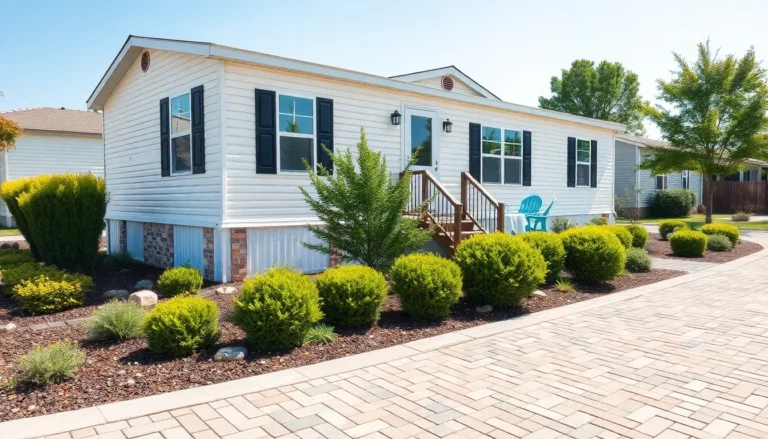Table of Contents
ToggleIn a world where prices seem to skyrocket faster than a cat on a laser pointer, finding ways to live economically has never been more crucial. No one wants to feel like they’re living in a budget horror movie, right? With a sprinkle of creativity and a dash of resourcefulness, anyone can transform their financial woes into a wallet-friendly lifestyle that even their bank account will thank them for.
Understanding Economic Living Ideas
Economic living ideas focus on strategies that enhance financial well-being. Individuals often embrace minimalist lifestyles to reduce expenses and declutter their lives. Emphasizing budget-friendly choices enables savers to allocate funds toward savings or investments. Simple changes, such as cooking at home, contribute to significant savings over time.
Living within one’s means fosters financial stability. Crafting a realistic budget serves as a cornerstone for economic living. People can track their spending habits to identify unnecessary expenses. Evaluating subscriptions or memberships uncovers hidden costs that can be eliminated, allowing for a more streamlined approach to personal finances.
Exploring creative alternatives to spending often leads to a fulfilling lifestyle. Thrifting, for instance, provides access to quality clothing and home goods at reduced prices. Sharing resources with friends or neighbors promotes community engagement and lowers individual expenses. Utilizing public transportation instead of personal vehicles can yield substantial savings on fuel and maintenance costs.
Prioritizing sustainability supports both the environment and personal finances. Growing a small garden in backyards or even on balconies yields fresh produce while cutting grocery bills. Another approach involves finding free local events and activities, enriching lives without straining budgets.
Practicing mindfulness about consumption habits helps individuals make informed purchasing decisions. Conscious spending prioritizes needs over wants, ultimately leading to a more gratifying economic living experience. By implementing these economic living ideas, individuals can enhance their financial security and create a more balanced lifestyle.
Benefits of Adopting Economic Living Ideas


Adopting economic living ideas provides numerous advantages, enhancing both finances and lifestyle choices.
Financial Savings
Financial savings rank high among the benefits of economic living. Cutting unnecessary expenses allows for better management of budgets. Individuals often find financial freedom by prioritizing needs over wants. Creative solutions like thrifting enable people to acquire quality items at lower prices. Sharing resources fosters community connections while reducing individual costs. Crafting a realistic budget reveals spending habits that require adjustment. Tracking monthly expenditures highlights areas for potential savings. Overall, these strategies contribute to greater financial security and empower individuals to build a sustainable lifestyle.
Environmental Impact
Adopting economic living ideas positively influences the environment. Sustainable practices, such as gardening, reduce dependence on commercial produce. Consuming less helps decrease waste and promotes a greener planet. Using public transportation or carpooling lowers carbon footprints significantly. Engaging in recycling and upcycling encourages resourcefulness. Utilizing free local events nurtures a sense of community while minimizing environmental strain. Collectively, these actions create a significant positive impact on ecosystems while supporting a more affordable lifestyle. By embracing these principles, individuals contribute to a healthier planet and enhanced quality of life.
Practical Economic Living Ideas
Creative solutions enhance financial well-being while promoting sustainability. Here are several practical ideas to embrace.
Minimalist Lifestyle
Embracing a minimalist lifestyle reduces expenses significantly. Individuals can declutter their spaces, keeping only essential items. This approach not only simplifies living but also minimizes costs associated with maintenance and storage. Reducing possessions encourages mindful consumption, allowing for a more intentional approach to purchases. Many find that prioritizing quality over quantity leads to lasting satisfaction. Ultimately, adopting minimalism often reflects a deeper commitment to financial stability and personal freedom.
Budget-Friendly Meal Planning
Implementing budget-friendly meal planning saves both time and money. Preparing a weekly menu can prevent impulsive purchases and reduce food waste. Focusing on ingredients that are in season lowers grocery bills while improving meal quality. Cooking in batches allows individuals to create large portions, resulting in quick meals throughout the week. Incorporating pantry staples helps stretch the budget further. By planning meals ahead, many can enjoy nutritious diets without overspending.
DIY Home Projects
Engaging in DIY home projects promotes creativity while cutting costs. Tackling simple repairs or upgrades prevents expensive labor fees. Individuals can personalize their spaces by learning basic skills like painting or landscaping. Using recycled materials not only supports sustainability but also makes projects more affordable. Many community resources offer free or low-cost workshops, empowering people to gain new skills. By participating in DIY projects, individuals often find fulfillment and increased home value.
Tips for Implementing Economic Living Ideas
Implementing economic living ideas requires practicality and strategic planning. Focusing on essential aspects significantly enhances financial wellness.
Creating a Budget
Establishing a budget forms the foundation for effective economic living. First, track all expenses to identify spending patterns. Analyzing these costs helps highlight areas for reduction. Prioritize necessities over luxuries to allocate funds more effectively. By setting realistic goals, individuals can create a sustainable budget. Review the budget regularly to adjust for changing circumstances or unexpected expenses. Furthermore, using <a href="https://barabaracartland.com/saving-tips-for-young-adults”>budgeting apps provides an organized overview of finances, simplifying the tracking process.
Finding Discounts and Deals
Finding discounts and deals significantly contributes to economic living. Begin by signing up for newsletters from local stores and online retailers that offer exclusive promotions. Taking advantage of loyalty programs allows for additional savings on everyday purchases. Utilize coupon websites and apps to discover current discounts before shopping. Exploring thrift stores and secondhand shops provides opportunities for unique finds at lower prices. Joining community groups or social media pages focused on sharing deals can also yield helpful resources. Overall, remaining proactive in seeking bargains fosters a more economical lifestyle.
Embracing economic living ideas can transform financial challenges into opportunities for a more fulfilling lifestyle. By prioritizing needs over wants individuals can achieve significant savings while fostering community connections. Mindful consumption and sustainable practices not only enhance personal finances but also contribute positively to the environment.
With practical strategies like budgeting meal planning and DIY projects individuals can simplify their lives and reduce expenses. These approaches encourage creativity and resourcefulness making it easier to navigate rising costs. Ultimately adopting these economic living principles paves the way for greater financial security and a more balanced way of life.




